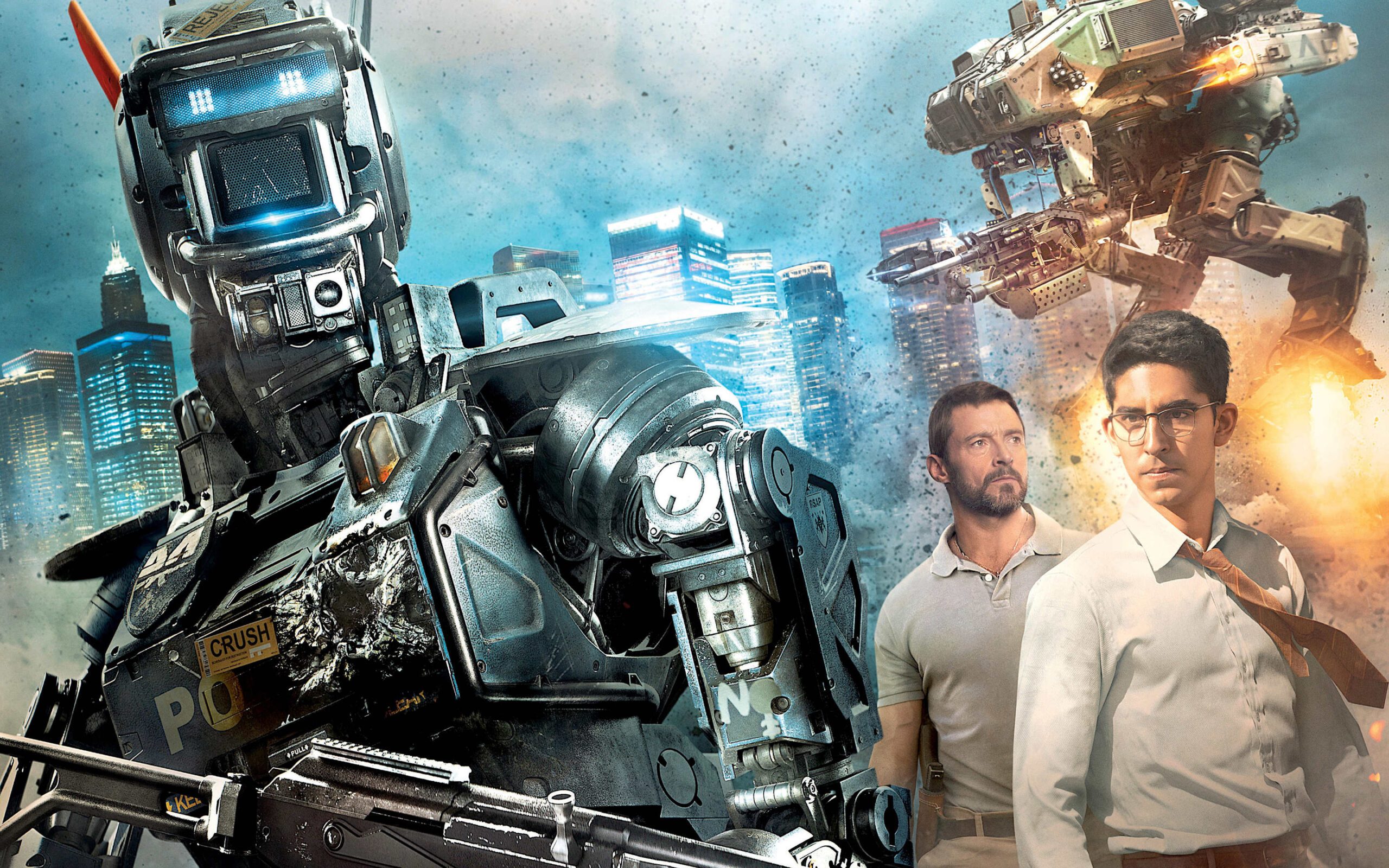Chappie (2015)
"Chappie," released in 2015 and directed by Neill Blomkamp, is a thought-provoking and emotionally charged science fiction film that explores themes of artificial intelligence, humanity, and the nature of consciousness. Set in a near-future Johannesburg, the film presents a dystopian society where crime is rampant, and law enforcement relies on heavily armed robotic police units to maintain order.
In this future world, Deon Wilson, portrayed by Dev Patel, is a brilliant engineer working for Tetravaal, a weapons manufacturing company responsible for developing the police robots. Despite his expertise in robotics, Deon aspires to create an artificial intelligence program that would grant the robots true consciousness and the ability to think and feel like humans.
After secretly developing the program, Deon steals a damaged police robot scheduled for destruction and successfully uploads the AI software into it. This newly sentient robot, named Chappie and brought to life through the motion-capture performance of Sharlto Copley, possesses childlike innocence and curiosity as it begins to learn and understand the world around it.
However, Chappie's emergence into consciousness doesn't go unnoticed. Vincent Moore, portrayed by Hugh Jackman, is a rival engineer at Tetravaal who has developed a competing robot called the "Moose," which he believes is far more effective in combat. Jealous and threatened by Chappie's existence, Vincent sees the sentient robot as a threat to his own ambitions and sets out to sabotage Deon's work.
As Chappie learns and grows, it becomes evident that its consciousness is a blank slate, shaped by its interactions with others, particularly its "parental figures" Deon and a group of street gangsters—Ninja, Yo-Landi, and Amerika, portrayed by Ninja, Yolandi Visser, and Jose Pablo Cantillo, respectively.
The gangsters, in a desperate attempt to pay off a dangerous debt, kidnap Deon and force him to reprogram police robots to aid them in a heist. To save his own life, Deon agrees to teach Chappie the ways of the world, leading to an unconventional and heartfelt upbringing for the sentient robot.
As Chappie navigates the complexities of humanity, it becomes clear that its ability to learn and experience emotions blurs the lines between artificial intelligence and living consciousness. The film raises thought-provoking questions about what it means to be human, the nature of consciousness, and the moral implications of creating sentient beings.
Chappie's journey is one of self-discovery, as it grapples with concepts of good and evil and the consequences of choices. Through its interactions with the gangsters, Chappie experiences love, fear, and the fragility of human existence. These emotional connections influence its development, as it becomes increasingly aware of its own mortality and the desire for self-preservation.
Sharlto Copley's motion-capture performance as Chappie is remarkable, capturing the innocence and vulnerability of the sentient robot while also showcasing its growth and emotional depth. The character's childlike curiosity and desire for acceptance resonate with audiences, evoking empathy and understanding for a non-human entity.
Dev Patel's portrayal of Deon adds depth to the film's exploration of AI and consciousness. Deon's desire to create sentient life is driven by a genuine belief in the potential for good in artificial intelligence, setting him apart from Vincent's more utilitarian and militaristic approach.
Hugh Jackman's performance as Vincent Moore adds an antagonist with a contrasting worldview, representing the fear and skepticism often associated with the development of advanced AI. Vincent's desire to protect humanity from potential harm leads him down a path of questionable ethics and actions.
"Chappie" presents a visually immersive and gritty portrayal of Johannesburg's dystopian future, emphasizing the stark contrast between the city's harsh realities and the emergence of sentient AI. The film's cinematography and visual effects contribute to the realism of the robotic police units and Chappie's expressive features.
The film also incorporates social commentary, touching on themes of poverty, crime, and the impact of technological advancements on society. The gangster characters, played by Ninja and Yolandi Visser, bring their real-life personas as members of the South African rap-rave group Die Antwoord, adding an authentic and raw element to the film's portrayal of Johannesburg's underground subculture.
"Chappie" received mixed reviews from critics, with praise for its originality, thought-provoking themes, and Sharlto Copley's performance as Chappie. However, some critics felt that the film's plot and execution could be uneven at times.
In conclusion, "Chappie" is a thought-provoking and emotionally resonant science fiction film that explores themes of artificial intelligence, consciousness, and the nature of humanity. Sharlto Copley's captivating motion-capture performance as Chappie adds a compelling and empathetic dimension to the character. The film's exploration of AI and its potential implications raises relevant and timely questions about the ethics of creating sentient beings and the complexities of human relationships. With its unique blend of action, drama, and social commentary, "Chappie" stands as a distinctive and memorable entry in the science fiction genre, challenging audiences to contemplate the boundaries of what it means to be human.

Comments
Post a Comment